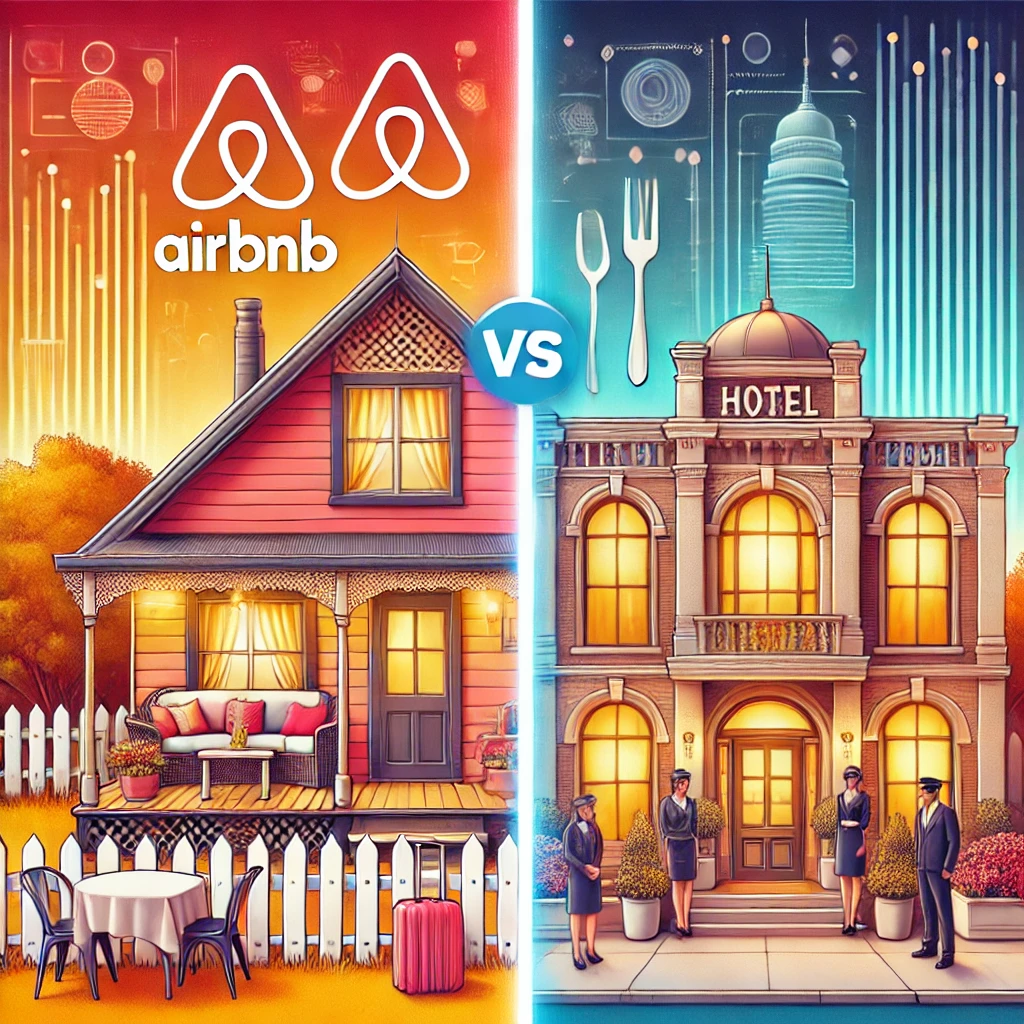Airbnb vs. Hotels: Why Travelers Are Choosing Rentals Over Traditional Stays

Airbnb vs. Hotels: A Comparative Analysis
In the evolving landscape of travel accommodations, both Airbnb and traditional hotels offer distinct advantages and challenges. This analysis delves into the pros and cons of each, supported by data from reputable sources, and examines trends over the past five years with projections for the future.
Pros and Cons
Airbnb:
- Pros:
- Cost-Effectiveness: Airbnbs are typically more affordable than hotels. As of 2022, hotels have a 26.6% higher Average Daily Rate (ADR) than rentals in large cities. AirDNA
- Unique Experiences: Offers a variety of accommodations, from entire homes to private rooms, allowing guests to immerse themselves in local neighborhoods.
- Flexibility: Provides options for longer stays with amenities like kitchens and laundry facilities, catering to families and extended trips.
- Cons:
- Consistency: Quality and amenities can vary significantly between listings.
- Regulations: Some cities have strict regulations on short-term rentals, potentially limiting availability.
- Service Limitations: Lacks standardized services such as daily housekeeping or on-site concierge.
Hotels:
- Pros:
- Standardization: Offers consistent quality and service levels across locations.
- Amenities: Provides on-site facilities like gyms, pools, restaurants, and room service.
- Security: Professional security measures and adherence to safety regulations.
- Cons:
- Cost: Generally higher nightly rates compared to Airbnb, especially in major cities.
- Space: Typically offers less space than rental properties, which can be a drawback for families or groups.
- Authenticity: May lack the local charm and personalized experiences that some travelers seek.
Market Share Shift
Over the past decade, Airbnb has significantly disrupted the traditional hotel industry. Operating in more than 81,000 cities and 191 countries, Airbnb's platform offers lower ADRs, more room options, and a more immersive, local experience for travelers. Craft.co
However, recent data indicates a shift. In the first quarter of 2023, Airbnb's web traffic grew by 6% in the U.S., while its peer group saw an 18% increase. Notably, traditional hotel chains like Hilton and Marriott experienced web traffic growth of 27% and 25%, respectively. This suggests that while Airbnb has made significant inroads, traditional hotels are adapting and regaining market share. Similarweb
Factors Driving the Shift
Several factors contribute to the shifting market dynamics:
- Consumer Preferences: Travelers are increasingly seeking unique, personalized experiences that Airbnb offers. The desire for authentic local experiences and the availability of diverse accommodation options make Airbnb appealing.
- Cost Considerations: Airbnb often provides more cost-effective solutions, especially for group travel or extended stays. However, additional fees and variability in pricing can sometimes offset these advantages.
- Regulatory Environment: As cities implement stricter regulations on short-term rentals, the availability and attractiveness of Airbnb listings may be impacted, potentially driving travelers back to traditional hotels.
- Hotel Industry Adaptation: Traditional hotels are innovating by incorporating local experiences, flexible check-in/check-out times, and personalized services to compete with Airbnb's offerings.
Conclusion
Both Airbnb and hotels offer unique advantages. Airbnb provides personalized, cost-effective stays with a local touch, while hotels offer standardized services with professional amenities. Travelers should weigh these factors based on their preferences and the nature of their trip to make informed accommodation choices.
Still Have Questions?
We're here to assist you with any inquiries.
